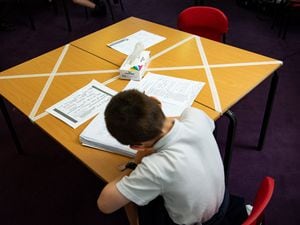Children miss 38 school days each over two terms due to Covid
Pupils in the Black Country and Staffordshire missed the equivalent of 38 days each of in-school teaching due to Covid-19, official figures show.

Department for Education data showed more than half of all possible school days were missed over two terms in the region, up to March this year.
It comes as education chiefs warned the pandemic had caused massive disruption across England and warned schools are "not out of the woods yet".
Students in Dudley missed the equivalent of 1.6 million school days between September to December last year and January to March 31 this year – equating to roughly 38 school days missed per pupil.
In Wolverhampton, students missed the equivalent of 1.5 million school days over the two terms which equates to roughly 39 per pupils. In Walsall, pupils were absent for 1.7 million school days over the two terms which equates to roughly 39 per pupil.
Elsewhere in Sandwell, students missed the equivalent of 2.2 million school days over the two terms – equating to roughly 41 per pupil. And in Staffordshire, pupils missed the equivalent of 3.8 million school days over the two terms – equating to roughly 36 per pupil.
The figures include state-funded primary, secondary and special schools in the area. Children across England were sent home to self-isolate when coronavirus cases were detected in the autumn.
But for the majority of the spring term, students – except children of key workers and vulnerable pupils – were told to learn remotely amid the national lockdown. Around 252 million school days were missed nationally because of Covid-19 over both terms – 29.4 per cent.
Geoff Barton, general secretary of The Association of School and College Leaders, said: "Covid has caused widespread educational disruption across the country, but the impact hasn’t been uniform.
"Even when schools were fully open during the last academic year, attendance varied widely depending on local circumstances. Unfortunately, there is still a very high level of disruption taking place this term and we are not out of the woods yet."
He said the immediate priority for the Government should be to end disruption by increasing the vaccination roll out for 12 to 15-year-olds and encouraging twice-weekly home-testing.
James Bowen, director of policy at school leaders’ union NAHT, said: “This data serves as a useful reminder at just how disruptive the pandemic has been for children and young people.
“Schools worked hard to provide remote learning, but we know that is no substitute for being in the classroom."
The UK Health Security Agency (UKHSA) says regular lateral flow test will help to stop the infection spreading in education settings.
Across the West Midlands region the number of infections is 460.3 per 100,000 – with the highest local authority rate at 706 cases per 100,000 people. Last week 27,442 positive cases were recorded here.
West Midlands UKHSA public health consultant Soili Larkin said: “With case rates on the increase, especially in 10 to 19-year olds, it’s really important that children and young people take a lateral flow test.
"We’re also asking families and close friends to take a rapid test, as we are seeing increases in all age groups, especially those over 60. Mixing with different generations over the holiday means more chance of asymptomatic transmission to people at increased risk, who also may not have had their booster vaccination yet.
“It is also important that children and young people get their Covid-19 vaccination. This is now easier than ever before, as vaccinations are now available both through school and through walk-in centres.”
Alongside testing and vaccination, there are other important measures children and their families can take to protect themselves such as ventilating spaces by opening windows, regular hand washing and wearing face coverings in crowded enclosed spaces.
A Department for Education spokeswoman said the vaccination programme and adherence to public health advice has put schools in a better position than the last academic year.
She added: “We continue to work with parents and school and college staff to maximise students’ time in the classroom, and our long-term education recovery plan, supported by over £3 billion to date, will deliver world class teacher training and give millions of children access to high-quality tutoring.”





